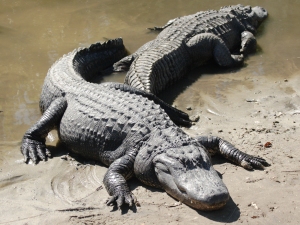
Two American Alligators (Photo/Matthew Field)
Oh alligator love, it’s not as fickle as you might think. Get on a gator’s good side and you may just have found a friend for life, if you’re another alligator of course.
In a study that combines field science with molecular biology, researchers from the Savannah River Ecology Laboratory found that alligators were surprisingly loyal partners and akin to birds in their mating habits. The discovery offers new insights into evolutionary links and behavior of crocodilians, birds and dinosaurs – and certainly, at least where one science writer is concerned, proving there is a lot more going on behind those alligator eyes than a cold reptilian stare.
Researchers trapped and re-trapped alligators at Louisiana’s Rockefeller Wildlife Refuge, 76,000 acres of alligator dream real estate bordering the Gulf of Mexico. “Given how incredibly open and dense the alligator population is at RWR, we didn’t expect to find fidelity,” said researcher Stacey Lance. “I don’t think any of us expected that the same pair of alligators that bred together in 1997 would still be breeding together in 2005 and may still be producing nests together to this day.”
Crocodilians have already proven to be more invested in the care of their offspring than most other reptiles, actively nurturing young and defending nests. Crocodiles are even known as considerate egg-layers. As a female drops the egg, she will blindly catch it with a hind leg before it hits the ground and gently place it in the nest. But up until now alligators were thought to be polygamous, mating with several different partners and leading to many fathers for a single nest.
After ten years of following alligators at the refuge, scientists Lance, Travis Glenn, Ruth Elsey and Tracey Tuberville discovered that 70 percent of female alligators stick with who they like. Even if they have multiple partners, the same bachelors get picked year after year, regardless of whether females encounter a new slew of potential suitors.
The study marks the first time fidelity has been observed in any crocodilian species. “In this study, by combining molecular techniques with field studies, we were able to figure something out about a species that we never would have known otherwise,” said Lance. “Hopefully future studies will also lead to some unexpected and equally fascinating results.”
Results of the study were published in the October 7 issue of Molecular Ecology.

